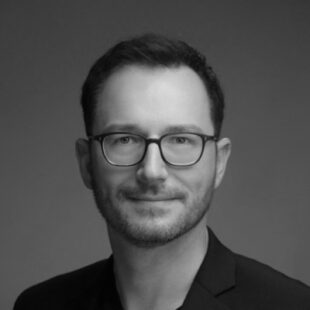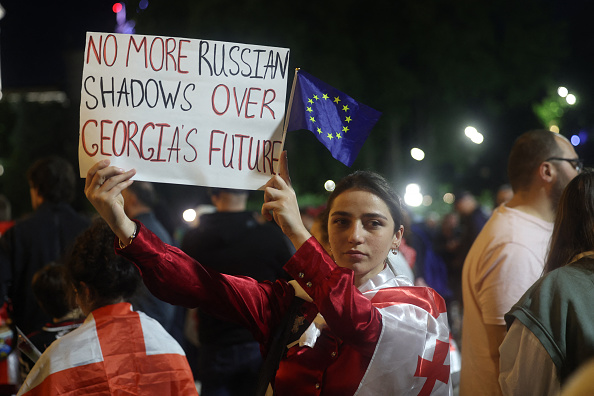SUBSCRIBER+EXCLUSIVE ANALYSIS — In a former Soviet republic, tens of thousands of people take to the streets to protest Russian interference. The Kremlin denies any meddling, and the U.S. says the country faces a choice between Moscow and the West. It’s a narrative familiar to anyone who followed the situation in Ukraine long before Russia’s full-scale invasion in February 2022, but this is the latest news from Georgia, which like Ukraine won its independence from the Soviet Union more than three decades ago.
The spark for the current unrest is a piece of legislation known as the “foreign agents” bill, which would require NGOs and independent media that receive more than 20% of funding from foreign donors to register as organizations “bearing the interests of a foreign power.” Opponents say the measure is the creation of a Russia-backed government, and bears an uncanny resemblance to legislation passed in Russia in 2012 which led to a harsh crackdown on domestic opponents. For many in Georgia, a country that has bristled for decades over Russian influence, the bill is a step too far.
The protests began a month ago, and have grown steadily since. Some 50,000 people took to the streets of the capital, Tbilisi, over the weekend, one of the largest demonstrations Georgia has seen since the collapse of the Soviet Union in 1991. Protestors carried the flags of Georgia, the European Union and Ukraine, and chanted slogans against what they call the “Russian Law.”
On Tuesday, parliament approved the bill, and while President Salome Zourabichvili – an opponent of the government – said she would veto the measure, the presidency is a relatively weak office in Georgia, and the ruling Georgian Dream party has sufficient numbers in parliament to overrule her.
The Georgia showdown is also seen as a fundamental struggle between Russia and the West. Leaders in Europe and the U.S. have joined the bill’s Georgian critics to denounce it as authoritarian and link it to Russia’s broader ambitions.
“We are deeply alarmed about democratic backsliding in Georgia,” White House national security adviser Jake Sullivan wrote on X. Prior to the vote, Sullivan said that “Georgian Parliamentarians face a critical choice – whether to support the Georgian people’s EuroAtlantic aspirations or pass a Kremlin-style foreign agents’ law that runs counter to democratic values.”
The Kremlin has denied any association with the Georgian legislation.
Polls show an overwhelming majority of Georgia’s 3.7 million people lean to the West – keen to join the European Union and the NATO military alliance – and for now they have vowed to keep protesting.
“The government should hear the free people of Georgia,” a young protestor named Nino told Reuters. “We never wanted to be part of Russia,” she said. “And it has always been and always will be our goal to be part of Europe.”
Cipher Brief Managing Editor Tom Nagorski spoke to several experts about the crisis and its implications for Georgia and beyond: a pair of Cipher Brief experts, Ralph Goff and Paul Kolbe, former CIA officers with experience in the region; the Ukrainian scholar and NGO leader Roman Sheremeta; and the Georgian journalist and former Voice of America editor Ia Meurmishvili, who has been reporting on the situation from Tbilisi. Meurmishvili called the crisis “a tipping point on many levels” – for Georgia, for other former Soviet republics, and for the future of democracy in the region.
THE CONTEXT
- The “foreign agent” bill would require nongovernmental organizations and media enterprises that receive over 20% of their funding from abroad to register and provide financial statements about their activities. Failure to do so could result in heavy fines.
- Supporters of the bill say it aims to make foreign funding more transparent and counter foreign influence. They also say it is similar to a U.S. law, the Foreign Agents Registration Act.
- Critics of the bill say it is modeled after a Russian law that the Kremlin has used to snuff out political opposition and civil society. They worry the legislation will be used to silence dissent and free expression.
- The ruling Georgian Dream party drafted the legislation. Georgia’s parliament approved the bill. Georgian President Salome Zourabichvili has vowed to veto it, but parliament can override her objection with a simple majority.
- U.S. Assistant Secretary of State for European and Eurasian Affairs James O’Brien visited Georgia this week and warned that the U.S could impose financial penalties and travel restrictions if the bill is not changed or if security forces violently break up protests.
- Russia invaded Georgia in 2008 and occupied around 20 percent of its territory. Moscow supports the breakaway regions of South Ossetia and Abkhazia.
THE INTERVIEWS
Ia Meurmishvili
Ia Meurmishvili is a former Managing Editor at Voice of America’s Georgian Service, where she hosted the weekly news magazine, “View from Washington.” She is a frequent commentator and moderator in international discussions about U.S. foreign and national security policy, particularly with respect to the Caucasus and Eurasia region.

Roman Sheremeta
Roman Sheremeta, Ph.D., is a chairman of Ukrainian American House, a founding rector of American University Kyiv, and a professor of economics at the Weatherhead School of Management at Case Western Reserve University.

Paul Kolbe
Paul Kolbe is former director of The Intelligence Project at Harvard University’s Belfer Center for Science and International Affairs. Kolbe also led BP’s Global Intelligence and Analysis team supporting threat warning, risk mitigation, and crisis response. Kolbe served 25 years as an operations officer in the CIA, where he was a member of the Senior Intelligence Service, serving in Russia, the Balkans, Indonesia, East Germany, Zimbabwe, and Austria.

Ralph Goff
Ralph F. Goff is a 35 year veteran of the CIA where he was a 6-time “Chief of Station” with extensive service in Europe, the Middle East, and Central and South Asia including several war zones. As a Senior Intelligence Service Executive he was Chief of Operations for Europe and Eurasia responsible for all CIA activities and operations in dozens of countries. Ralph was also Chief of CIA’s National Resources Division, working extensively with “C Suite” level US private sector executives in the financial, banking, and security sectors.
The news from Tbilisi
Meurmishvili: To be honest, the situation is tense. You can feel the tension in conversations in the air every night. Thousands, and in some cases tens of thousands of young people come out in the streets. They basically stay up all night, move from one location to another to make the government hear them and see them, because it seems like the government doesn’t really want to have a conversation with them about this bill and what it means for Georgia’s future. So we’re talking about teenagers, Gen Z mainly. And the older generation as well, who cannot understand why the government is pushing so hard for this bill.
What outrages people and causes this wave of severe opposition is that all the Georgian organizations that have been working, existing, growing since Georgia’s independence in 1991, if they are getting more than 20% of their funding from a foreign source, they will have to register as a foreign agent. What that means is that all these organizations that have tirelessly worked for the past 30 years to put Georgia on this democratic market economy, a European path, the government wants to call them all foreign agents, but these people are patriots. They were working to help their country succeed.
It’s basically a copy, at least in spirit, of the Russian law from 2012 when Putin started exactly with the same premise of transparency. And then he basically closed down and arrested and killed most of the free media, NGOs, anybody who was democratic in Russia. So that’s the concern in Georgia now. That’s causing the outrage.
Sheremata: The bill is very similar in nature to the one that Russia introduced a few years ago, which is a censoring tool for any foreign entity. So let’s say I’m chairman of Ukrainian American House and I’m helping Georgia, then I would be required to go through additional scrutiny of registration. Basically it’s an old-style KGB type of practice that would require any foreign entity or people to be scrutinized by the Georgian authorities, which is a typical thing that Russia does. So the fear is that when this is enacted, it will significantly undermine the whole democracy. And Georgia would be turning into a Russian type of regime.
Kolbe: The Russian fingerprints are all over this. And the Georgian people, being smart, get that. They see it for the threat it is. They understand the nature of how these things work. They understand what a creeping coup looks like.
What we’re seeing in Georgia now is the desire for freedom, the desire for closer ties with Europe, for EU membership, for NATO membership to be part of the West and not part of the “axis of autocracies.”
Goff: It’s a volatile situation, given how out of touch the Georgian Dream-led government appears to be with the Georgian people. Georgians are a fiercely proud people – they are proud of their culture, and especially so of their language, with its own alphabet, which they maintained through 79 years of Russian colonialism during the Soviet era. They are an expressive and emotional people, and this is reflected in how they interact socially and in how they conduct their politics.
Anti-Russian sentiment – a long history
Kolbe: You can’t look at what’s happening today without looking at Georgia in 2008, and in 1991, with the collapse of the Soviet Union. Georgia has had a hard road since the collapse of the Soviet Union, and you always had Russia in there seeing it as their own turf. They fueled and incited the civil wars that took place in the immediate post-Soviet period. They stationed troops there – so-called peacekeepers, but the peacekeepers were really occupiers.
For Russia, the idea of Georgia – somewhat like Ukraine – as independent, free, prosperous and democratic, sitting right on their borders, is very threatening. So they have for decades engaged in deep active measures to destabilize Georgia, to get rid of those politicians and leaders that were not aligned with Russian interests and to promote their own. And you saw this really come to a head in 2008 with the Russian invasion of Georgia.
Meurmishvili: I would say 85, 90% of the population is very negative towards Russia. Russia still occupies 20% of Georgia. There is a historical dimension to this, which is 70 years under the Soviet Union, then 300 years before that under the Russian Empire. So it’s in Georgian society to resist Russia.
But now the war in Ukraine has also exacerbated this issue because about 80% of the Georgians support Ukraine and the government is very silent, and I would say more pro-Russian than pro-Ukrainian. They are not saying that they are pro-Russian, but they have not joined the sanctions. They have not called Russia an invader. They never talk about the possibility of Ukraine’s victory, none of those things that you would expect from a friendly nation to come out. So that’s an additional factor to the anti-Russian sentiments in Georgia – Georgians identify with the Ukrainians now more than anybody, because Russia invaded Georgia in 2008 as well.
Goff: Georgians harbor deep resentments for the Russians, who they view as their tormentors and occupiers responsible for the losses of Abkhazia and Ossetia after short but bloody wars that remain pressure points for Russia to use against Tbilisi.
Sheremeta: Russia attacked Georgia in 2008, when they annexed part of Georgia – exactly what Russia repeated in 2014 with Ukraine. They did the same thing with Georgia in 2008. And then after they took over Georgia, they basically put their police apparatus to work to ensure that Georgia would have a Russian-backed government.
It’s not just Georgia
Kolbe: This is one piece of a long-running, systematic, quite intentional program for Russia to reestablish control over what it calls its “near abroad.” They don’t think of these as foreign countries – they see these nations as former constituent members of the Soviet Union, the collapse of which Putin has called the greatest geopolitical catastrophe of the 20th century. So in Georgia, this is just one piece of legislation, but it fits into the larger pattern of seeking to create environments that are friendly for and accommodating of Russian interests.
Sheremata: The Kremlin is basically trying to keep control of the whole Soviet Union, the former republics. That’s the Russian empire in action, trying to still have control over Ukraine or Georgia or Kazakhstan or other countries. And similar to Ukraine, Georgia has been electing a European path. Ukraine has elected a European path. And so Russia is trying to keep the grip on these countries in order not to let them go, but to have a part of the renewed Russian empire. So the situation in Georgia has a huge geopolitical significance that most people miss. Because if this happens to Georgia, if this happens to Ukraine, I mean which country is going to be next? Is it going to be Kazakhstan? Is it going to be the Baltic countries?
It’s a tipping point, potentially. Russia is trying to get back Georgia as its own. If you remember the “revolution of dignity” in Ukraine (in 2014), that was the tipping point for Ukraine, where Ukrainians basically came out and they said, we don’t want to go back to Russia. And the Russian government, the Russian-backed government, they actually put significant force – military force, police force against people. But it was a tipping point because Ukrainian people did not back down. They continued and they literally threw the government out.
Georgia is pretty much in exactly the same spot right now. And if you look at the protests, you see that people are being pushed to the brink. And so if Georgian people don’t push at this tipping point hard enough, it’s going to be a defeat for them and defeat for democracy overall.
Meurmishvili: It’s a tipping point on many levels. It’s not just Georgia and Georgian democracy and Georgia’s EU membership, it’s also the overall success of a post-Soviet country becoming a democracy.
The way forward
Kolbe: A couple of things to watch for. Do the protests maintain momentum and strength and steam? Do you start to see repressive measures being used, or violence to undermine the protests? I’m sure there’s lots of things being done to undermine the protests and discourage them. And I’ve seen reliable reports of counter protests being organized by the government, but it’s in the usual Russian fashion, busing in state employees from all around the country, the paid protestors and paid counter protestors, and I’m sure there’s many other actions being taken in terms of attempting to intimidate, to co-opt and suppress or repress the movement.
And you want to watch for violence, you want to watch very carefully what’s happening in Abkhazia and Ossetia, whether there’s any rumblings there because that’s an easy way for Russia to stir the pot.
Meurmishvili: We must monitor how this law will impact civil society, election observation missions, anybody who’s supporting Georgia’s democracy in different ways, and if those efforts and entities will be restricted. If they are, then we are entering a completely different phase in Georgia, which is very alien to that country, and very similar to what we have in Belarus, or even in Russia where you ban political parties from participating in the elections, you arrest your political opponents, you have no free media, no watchdog organizations.
We have about five months between now and the October elections. And then we will see how they’re conducted, not on the day of, but also before that – if we see the intimidation tactics, if we will have people arrested, how many political parties will be allowed to participate, and the election process itself.
Goff: It’s worth noting that the Georgians have, in the past, taken up arms when their politics become too divisive, and there is a fair chance they could do so again in reaction to overreach by the Georgian Dream government that subjugates desires for Western integration to Russian models of repression. A scenario involving a bloody popular uprising is not out of question.
Sheremeta: We will see what develops in the coming weeks. But this is pretty scary, to be honest. Knowing Georgian people, having friends from Georgia, knowing where they stand, I don’t think they will allow this government to continue. I honestly think that there will be riots and protests, and a pretty brutal confrontation between police and Georgian people.
The good thing is that Georgia is actually going to have elections in the coming year. But the fear is that through Russian influence and fraud, they can still retain their rule.
Read more expert-driven national security insights, perspective and analysis in The Cipher Brief because National Security is Everyone’s Business.


